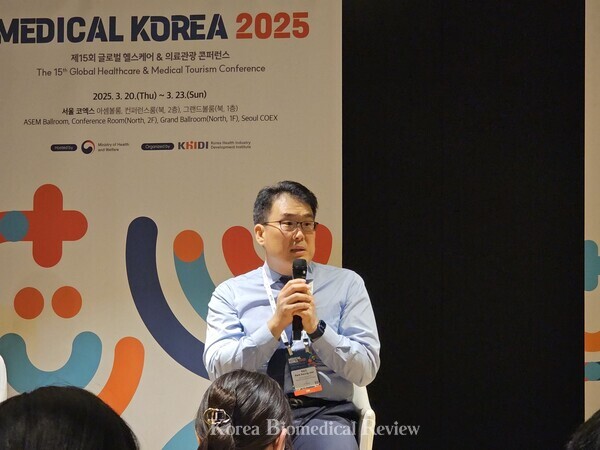In a rapidly evolving healthcare landscape, Professor Park Seung-min of Nanyang Technological University (NTU) in Singapore envisions a future where disease prevention is prioritized through precision health.

Speaking to reporters before giving his keynote speech at Medical Korea 2025 in Seoul on Thursday, Park stressed that while precision health is a relatively new concept, all technological limitations have already been overcome.
“Considering the speed of AI (artificial intelligence) development, the realization of precision health will happen in the near future,” Park said. “There is a movement around the world to implement precision health by creating smart cities that utilize various data sources to improve quality of life.”
Park, a physicist-turned-medical scientist, has devoted much of his research to leveraging artificial intelligence (AI) and smart technology to achieve this goal.
His work focuses on integrating everyday biological data into proactive healthcare, including his groundbreaking invention, the smart toilet, which analyzes urine and stool samples to detect early signs of disease. This innovation earned him the Ig Nobel Prize, a satirical award presented annually to celebrate unusual or trivial achievements in scientific research, for Public Health in 2023, making him the fifth Korean to receive the award.
Park’s research stems from the understanding that human waste provides one of the most frequent and abundant sources of biological data.
Much like traditional lab tests analyze stool and urine samples for signs of illness, his smart toilet continuously tracks changes in color, shape, and frequency of excretion. It employs AI to identify irregularities and automates record-keeping, reducing reliance on patients’ memory for tracking symptoms.
In addition to traditional sensors, the smart toilet features an anal recognition camera, leveraging the uniqueness of each individual’s anatomy for user identification.
(Related article: This Stanford scientist is so into ‘smart toilet.’ Here’s why.)
Beyond smart toilets, Park foresees a future where AI-powered home health monitoring seamlessly integrates with daily life.
He and his research team are developing smart glasses that track dietary habits and protein intake, complementing smart refrigerators capable of logging food consumption to provide holistic health insights. He also believes that chronic conditions such as diabetes will benefit from enhanced real-time health tracking, similar to how continuous glucose monitors (CGM) have revolutionized diabetes care.
Despite the promise of precision health, Park stressed regulatory and ethical challenges remain.
"As the implementation of precision health approaches, we must start preparing for it,” he said. "The most urgent issue is reaching an agreement among the government and members of society on data ethics."
Notably, data privacy concerns, particularly regarding biometric identification through devices like the smart toilet, pose hurdles to widespread adoption of precision health, Park added.
Park acknowledges that even if a user consents to sharing personal data, public restroom settings make it difficult to ensure that all users have given prior approval.
“Moreover, Korea’s strict regulations on telemedicine limit the ability of smart toilets and other health-monitoring devices to transmit medical data directly to physicians,” he said. “Unlike countries such as the U.S. and Singapore, where telemedicine laws are more flexible, Korea's legal framework presents an obstacle to full implementation.”
Park believes that changing public perception is key to overcoming these barriers.
He advocates for regulatory sandbox initiatives within smart city projects, where limited exemptions can be granted to trial AI-powered healthcare solutions. He points to similar initiatives led by the Ministry of Land, Infrastructure, and Transport, which have relaxed certain regulations within smart city pilot programs.
“By demonstrating the tangible benefits of AI-driven health monitoring, I hope to shift public opinion and regulatory perspectives toward greater acceptance of precision health technologies,” Park said.
As AI continues to advance at an unprecedented rate, Park argues that healthcare is at a critical turning point.
"A future where real-time health monitoring becomes as routine as wearing a smartwatch is coming,” he said. “With growing populations, increasing chronic disease burdens, and rising healthcare costs, the need for precision health is more urgent than ever.”
However, for this vision to become reality, both technological advancements and policy reforms must align, he added.
Park stressed that if these challenges are addressed, precision health has the potential to redefine global healthcare, making early detection and disease prevention an everyday reality for millions.
Related articles
- AI in healthcare: Emory expert urges cautious, calculated implementation
- Korea aims to attract 1mil. foreign patients, promotes AI-powered healthcare
- This Stanford scientist is so into ‘smart toilet.’ Here’s why.
- 'Doctor-led, disease-specific telemedicine platforms needed in Korea'
- Physicians warn that telemedicine for children will result in medical accidents and lawsuits

